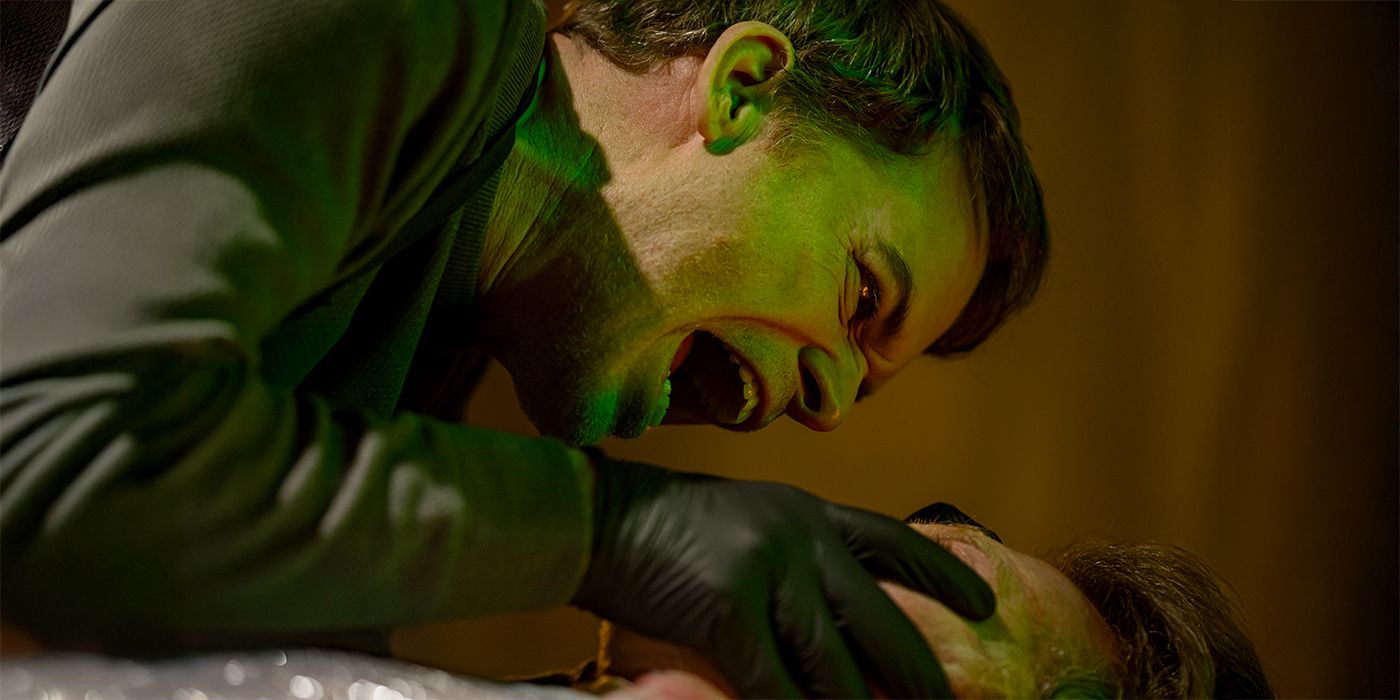There’s a reason why we keep coming back to Dexter Morgan. The morally complex antihero, portrayed with chilling charm by Michael C. Hall, has always blurred the lines of justice and horror. But amid the highs of the Showtime original series’ early seasons and a divisive finale that turned the former Bay Harbor Butcher into a sad lumberjack, Dexter has had more than one shot at a final chapter. In 2021, Dexter: New Blood tried to course-correct with a more explicit finality, and it almost worked — the operative word being “almost.” Instead, everything felt too neat and rushed for a story that was never meant to end with a tidy little bow.
Enter Dexter: Resurrection, a revival that doesn’t pretend its past didn’t happen. Across its first four episodes made available for review, this new 10-episode chapter doubles down on all the threads Dexter initially pulled at while residing in Iron Lake. But amid some very bloody moments that left the door slightly open for more, this new series has only smeared its past horrors into something messier, more reflective, and sometimes a little moving.
Set just weeks after the explosive end of New Blood, this new chapter revives not only Dexter but the show’s core identity. Everything we loved from the original is here in small doses, and though the first two episodes take their time establishing things, it’s clear Dexter: Resurrection has earned its second chance thanks to stronger writing and striking performances.
What Is ‘Dexter: Resurrection’ About?
After surviving a gunshot wound in the New Blood finale at the hands of his son, Harrison (Jack Alcott), Dexter awakens from a 10-week coma with more than just scar tissue. He is haunted by his sins (and some very literal ghosts of his past) while his teenager has gone missing. Deciding he needs to find him to set things right, Dexter’s search, with the help of a manifested conscience in the shape of his father, Harry Morgan (James Remar), leads him to New York City, where we learn predators are around every other corner.
While he is searching for the only existing family member he genuinely loves, New York has its own monster dubbed the “Dark Passenger,” who’s racking up victims and using Dexter’s old terminology like it’s trademark-free. Less than thrilled about the brand theft, Dexter’s instincts lead him to investigate, which guides him straight into the world of Leon Prater (Peter Dinklage), a twisted billionaire with a morbid fascination for serial killers and a mansion full of “murderabilia.”
With the help of his head of security, Charley (Uma Thurman), Prater is seemingly curating a collection of killers, though we’re not quite sure of his motives yet. Whether Dexter’s infiltrating this strange White Lotus-style slasher society or becoming a target himself, one thing’s clear: things get messy, fast when he meets the club members, including the likes of Krysten Ritter as Lady Vengeance, Neil Patrick Harris as a tattoo-obsessed trophy hunter, Eric Stonestreet as the Rapunzel Killer, and David Dastmalchian as the unnervingly calm Gemini Killer.
Meanwhile, Harrison is starting over as a bellhop at the Empire Hotel. On the surface, he’s rebuilding and trying to get through the day. But, we soon notice signs of his dark inheritance and a generational grief that begins to bubble up in subtle — and sometimes, not-so-subtle — ways. From menial tasks that border on compulsively methodical to putting someone’s fate in his own hands, Harrison’s trajectory echoes much of his father’s. But the question we ask ourselves isn’t whether he’s his father’s son, but rather: how long can he resist becoming him? Things heat up when Angel Batista (David Zayas), fresh off the heels of his return in New Blood, re-enters the picture and has a reunion with Dexter. With a presence that is both nostalgic and deeply foreboding, the former Miami PD detective already has his suspicions about his friend thanks to a tip from Angela Bishop (Julia Jones). Naturally, Dexter tries to play the part of the reformed man, but there are too many holes, and Angel isn’t letting go just yet.
One of the biggest surprises in Resurrection is just how much tighter the writing feels this time around. Eight seasons and one revival later, one of the most noticeable changes is in its approach to these characters, especially Dexter. Under returning showrunner Clyde Phillips, the series balances macabre with emotional complexity more effectively than New Blood could. The slow burn of the first two episodes might test some viewers’ patience (even with some exciting plot points), but it pays off because this isn’t a story rushing to resurrect a franchise — it’s reconstructing it from the inside out.
Dexter, in many ways, has grown up, and a near-death experience does something to him. This is not to say he is not the same anymore, but he’s a lot more tempered with his feelings. There are no more clunky monologues or overly telegraphed twists. Instead, we’re treated to some sharp dialogue and clever irony that lays the foundation for what a revival needed to look like in the first place.
Harrison’s interactions at the hotel where he’s working alongside a single mother named Elsa (Emilia Suárez) mirror Dexter’s bond with Rita (Julie Benz) from the original series. With this kind of past pain building identity, the writing leans into the psychology of inherited trauma. Is Harrison recreating his father’s path, or trying to rewrite it? The show doesn’t answer outright — at least not yet. But it’s that quiet restraint which makes it resonate. Even Dexter’s internal conversations with his late father feel more real. He’s not a young man anymore, and the exchanges touch on aging, trying to do the “right thing,” and the love between father and son.

Related
This ‘Dexter’ Pair Should’ve Ended Up Together
The series could have gone in a wildly different direction.
Of course, there’s still that sardonic edge we came to love in its initial run, especially when Dexter gets mad about the “Dark Passenger” stealing his moniker. But these moments of dark comedy and acerbic wit don’t undercut the tension. In so many ways, it sharpens the series and elevates who Dexter is or has the potential to be. Likewise, the writing integrates villains a lot more in line with the grandeur of their environment and what that playground can produce. Without spoiling any fun, Resurrection embraces the modern cult of true crime and surveillance paranoia in some really smart, chilling ways that make the series excitingly twisty. These killers he meets are not just “monsters of the week,” but reflections of our current obsession. Timely and darkly self-aware in a way that positions our antihero as a vessel for commentary on our attraction to violence, Dexter is no longer just the Bay Harbor Butcher.
Michael C. Hall Anchors ‘Dexter: Resurrection’s Excellent Cast
Almost 20 years later, Hall remains magnetic in the role that made him iconic outside Six Feet Under. But as Dexter is physically slower and emotionally bruised, there’s an added weight here that Hall taps into for his performance of the antihero. There’s a weariness felt in a man who is older, sadder, and more conflicted, and Hall plays it with immaculate restraint. The best, most pristine parts of this performance are seen in his reactions to others and an environment he’s not used to, all while wondering if redemption is even feasible. With a dry wit that still lands and sharp comedic timing, Hall gives another deliciously twisted, complex performance that keeps you interested from start to finish.
Meanwhile, Alcott is the emotional lynchpin of the series. His portrayal of Harrison is raw, heartbreaking, and deeply human as he battles the darkness within. Watching him move between PTSD, guilt, and violent instincts creates a character that is more than just a mirror of his father. The young actor shines in some of the more weighty scenes, especially in Episode 3’s “Backseat Driver,” where the broken teen straddles the line between vulnerability and volatility with stunning precision.
The supporting ensemble is equally compelling and captivating. Thurman’s mysterious Charley is all cool confidence and covert menace, a perfect foil for Dexter’s controlled chaos. Dinklage’s turn as Leon — the eccentric founder of what can only be described as a serial killer “club” — adds a bizarre, brilliant new flavor with some pointed and commanding charisma. Alongside the killer cast are Harris, Stonestreet, Dastmalchian, and Ritter — all guest-starring as different members of this dark circle and clearly having a blast playing against type.
While there is still more to see with them, it’s refreshing to see Ritter back on screen, giving us her best and proving she’s one of the most talented actresses on TV today. The chemistry she shares with Hall is equally engrossing. It’s not similar to his relationship with Season 2’s Lila (Jaime Murray) or Season 6’s Hannah (Yvonne Strahovski), but it does give the vigilante something different in terms of connecting with like minds. While functioning on the outside as a framework for Dexter to understand the bigger moral questions that Remar’s striking performance of Harry poses, the ensemble cast’s performances each lean into ambiguity without losing focus.
Ntare Guma Mbaho Mwine as Blessing Kamara, a kind-hearted ride-share driver who takes Dexter in, radiates warmth and calm in a city full of chaos. He becomes an unexpected anchor for Hall’s quieter scenes, especially as he finds himself in the company of good people, constantly. Last but certainly not least, Zayas is an absolute powerhouse alongside Hall, slipping back into Batista effortlessly with heart and gravitas in every scene. The reunion he has with Dexter is deeply layered and tense, but you do see another complex side of him when he’s gently trying to reach Harrison.
Is ‘Dexter: Resurrection’ Worth Watching?
After two endings that left fans feeling slightly disheartened that their favorite antihero was not getting the satisfying conclusion he deserved, Dexter: Resurrection is reinvigorating that charm we came to love when the series first premiered in 2006. With a few guest stars and cameos that will light up every fan, the show takes a bit to rev up its engine. But when it does, it’s gripping, stylish, and well-paced, a thematically rich return to form.
It’s not just more Dexter — it’s better Dexter. The writing is sharper, the characters are much more layered, and the moral dilemmas hit harder than ever. Sure, there’s still room to grow, but for now, Dexter: Resurrection is the gripping and fun revival of a story we thought was finished. Turns out, darkness never dies. It just gets smarter.
Dexter: Resurrection premieres July 11 with two episodes on Showtime, followed by an episode every Friday.

Dexter: Resurrection
A smart, blood-soaked revival that doesn’t rewrite the past — it owns it.
- Release Date
-
July 13, 2025
- Network
-
Showtime
- Dexter: Resurrection improves on New Blood with stronger dialogue and deeper emotional arcs.
- Michael C. Hall delivers a complex, magnetic performance that cuts deeper than ever.
- The show cleverly blends true crime obsession, generational trauma, and killer charisma into something fresh.
- The first two episodes take their time building momentum and may test viewer patience.


